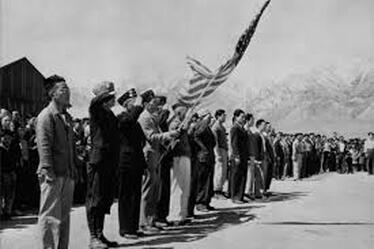|
What if the U.S. government knocked on your door and asked you, an ordinary citizen, to officially swear your loyalty to America. Would you? Probably, though some might feel offended at being asked. What if you were asked while imprisoned in a concentration camp on American soil because of your ancestral heritage? Would you still affirm your loyalty?  really That loyalty question was posed in early 1943 to Japanese Americans incarcerated in the ten “relocation camps.” It was part of a questionnaire created by the War Department and the War Relocation Authority designed to identify and segregate the “disloyal” from the “loyal” in the camps. The military initially administered the questionnaire to incarcerated Nisei males (born in the United States) eligible to serve in the U.S. armed forces in the segregated but now renowned 442nd Regimental Combat Team I profiled in my previous blog. It also administered it to Nisei already serving in the military. But the WRA morphed the questionnaire, titled "Statement of United States Citizen of Japanese Ancestry," into a loyalty test for all adult Japanese men and women held in WRA camps. The Japanese began calling it the “loyalty questionnaire.” With it, came resistance. Innocuous Questions? Much of the questionnaire appeared innocuous: identifying family members, educational levels, religion, recreational activities, and family members or property located in Japan. But the Office of Naval Intelligence had largely designed the questions, and scored the answers to assess “Americanness” and “Japaneseness.” For example, answering that you were a Christian, belonged to the Boy Scouts, and didn’t speak Japanese well demonstrated Americanness. Being Buddhist, belonging to a judo club, and speaking fluent Japanese scored negatively, predicting undue Japaneseness. Questions 27 and 28 were far blunter. Question 27 asked if the person would serve in combat duty “wherever ordered.” Question 28 proved particularly troublesome to those incarcerated in the camps. Will you swear unqualified allegiance to the United States of America and faithfully defend the United States from any and all attack by foreign or domestic forces, and forswear any form of allegiance or obedience to the Japanese emperor, or other foreign government, power or organization? The No-Nos The vast majority of prisoners declared their loyalty and renounced the emperor—even as they lived in thin-walled barracks behind barbed wire and gun towers. Yet the two questions confused, angered, insulted, or worried many others. With Question 27, some Nisei feared that acknowledging a willingness to serve would mean they were volunteering. As I discussed in my previous blog post, it was asking a lot of someone to fight for the nation incarcerating you and your family. As to forswearing allegiance to the Japanese emperor, the question not only insulted those already U.S. citizens, it implied they’d once been loyal to Japan and disloyal to America. Some feared they’d be deported to Japan regardless of their answer. Others worried their disavowal of the Emperor would sow division among their own people. The question was of special concern to Issei—first-generation immigrants who had arrived before the Immigration Act of 1924 barred further immigration. Issei were not allowed to become U.S. citizens. Renouncing their Japanese citizenship would leave them stateless. (They eventually persuaded the WRA to revise the question to eliminate their concern.) Ultimately, 17 percent of all incarcerated adults and 20 percent of all Nisei said no or gave qualified answers to the questions. Hence, they became known as the “no-nos.” Renouncing their U.S. Citizenship The Tule Lake relocation camp in California harbored the highest percentage of “no” responses. So the WRA designated the camp home to the “disloyals.” No-nos from the other nine camps were transferred to Tule, which eventually held 12,000 men and women (and their children). Camp Amache in Colorado, key to The Big Dive plot, had the smallest percentage of no-nos, due in part to the relatively compassionate camp administration. To add insult to all this, the federal government passed the Renunciation Act of 1944. This act allowed any citizen to renounce his or her citizenship during wartime, though it was really aimed at encouraging Nisei and Kibei to renounce their American citizenship. (Kibei were born in the United States but studied in Japan before returning to America.) Over 5,500 Tule Lake prisoners renounced their citizenship, and 1,300 were shipped to Japan, including 35 former internees from Camp Amache. Proponents of the camps cited this as evidence of disloyalty and proof of the need for internment. Critics contend that these “disloyalist” citizens had been persecuted, lost their jobs and property, and were terrorized at Tule Lake. Renouncement was a way to protest. A civil rights attorney, Wayne Collins, managed to invalidate most of the renunciations after the war, citing duress and intimidation. But the law, along with the loyalty questionnaire, sowed bitter recrimination among the internees, both at the U.S. government—and their own. Those answering yes castigated the renouncers, while the no-nos felt betrayed by those who answered yes—especially those who chose to fight for America. These actions once again illustrate the cruelty and racism of this shameless chapter in American history. How would you answer a loyalty oath if our government came knocking?
0 Comments
Leave a Reply. |
Bruce Most is an award-winning mystery novelist and short-story writer. His latest novel, The Big Dive, is the sequel to the award-winning Murder on the Tracks, which features a street cop seeking redemption while investigating a string of murders in 1949 Denver. His award-winning Rope Burn involves cattle rustling and murder in contemporary Wyoming ranch country. Bonded for Murder and Missing Bonds features feisty Denver bail bondswoman, Ruby Dark. Archives
February 2022
Categories |

 RSS Feed
RSS Feed